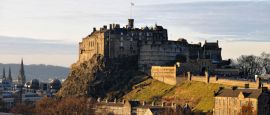Scotland History, Language and Culture
History of Scotland
Scotland's written history began with the arrival of the Romans in the 1st century. Met with fearsome Caledonian tribes known as the Picts, the Romans failed to conquer Scotland and left by 212 AD.
Then in the 9th century the Vikings arrived, and a few centuries later, the infamous power-grab from England began in 1296 when England's monarch, Edward I, believed that he should rule over Scotland. This resulted in two wars – the Battle of Stirling Bridge (1297) and the Battle of Bannockburn (1314). Eventually, England's Edward II agreed to recognise Scotland's independence in 1328.
In 1603, James VI of Scotland took the English and Irish thrones as James I, following the death of England's Elizabeth I who was childless. The union between Scotland and England was further reinforced in the 1707 Treaty. Nonetheless, the spirit of independence remained strong and sparked several Jacobite Risings. In 1746, the ultimate and tragic Battle of Culloden saw the Jacobite army defeated by British forces.
In 1997, Scotland voted for a devolved government and the new government body met for the first time on 12 May 1999 in Edinburgh. The devolution means that the Scottish government is responsible for the country's economy, education, health, justice, rural affairs, housing, environment, equal opportunities, consumer advocacy and advice, transport and taxation.
Did you know?
• Scotland's national flower is the thistle.
• Scotland has 790 islands, of which only 130 are inhabited.
• Scottish Gaelic, an ancient Celtic language that evolved from Old Irish, is one of the four official languages. The others are English, Scots (similar to English) and British Sign Language.




 You know where
You know where